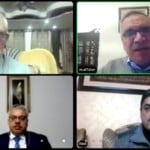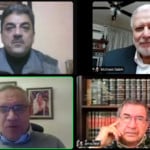Al-Zaytouna Centre for Studies and Consultations held on 2/2/2021 the third session of the panel discussion, “The Palestine Issue: Strategic Evaluation 2020 – Strategic Assessment 2021.”
Participants included a group of researchers, scholars, specialists and those interested in the Palestine issue, who discussed the developments witnessed in Jerusalem, the changes undergone by the Palestinian resistance and the changes that affected the structure and capabilities of the Israeli army, the right of the Palestinians abroad to participate in the Palestinian decision-making, and the economic situation in Gaza Strip and the West Bank. They also discussed the most prominent projections for 2021.
The panel discussion was moderated by Dr. Raid Nairat, the head of the Political Science Department at An-Najah National University, and the main panelists included Ziad Bheis, a researcher specialized in Jerusalem; Mo‘in al-Taher, author and researcher; Hisham Abu Mahfuz, deputy secretary-general of the Popular Conference for Palestinians Abroad; and Prof. Dr. Moein Ragab, senior economic analyst.
Prof. Dr. Mohsen Mohammad Saleh opened the session, while Nairat expressed his condolences on the demise of the Palestinian political activist and academic ‘Abdul Sattar Qassem, who was a professor of political science and Palestinian studies at An-Najah National University.
The first panelist was Ziad Bheis, whose paper was entitled, “Jerusalem: Developments and Possible Prospects.” Bheis referred to three historically progressive contexts of the conflict in Jerusalem: The historical shift in the nature of the struggle with Zionism, the shift of the ruling elite from secular nationalism to right-wing religious nationalism, and when the US adopted the Israeli position concerning the identity of Jerusalem during Trump’s term. Bheis discussed the most prominent events during 2020, such as the Great Fajr Campaign at al-Aqsa mosque, the COVID-19 pandemic and its impact on the masses, and singling out the Orthodox popular movement, especially with the decline in the number of Christians in Jerusalem. He also discussed the issues of demolition, demography and settlement building in the West Bank, especially in Jerusalem.
As for 2021, Bheis expects that Israel would attempt to take advantage of the pandemic to limit the popular will to the maximum, the Judaization of Jerusalem will lose the international interest, while internally this interest will remain during the Israeli election and beyond. However, he expects that during 2021, the Palestinian popular interest in Jerusalem and support will regain their momentum.
The second panelist was Mo‘in al-Taher, whose paper was entitled, “The Palestinian Resistance: Developments and Possible Prospects. He discussed the changes undergone by the Palestinian resistance, and the changes that affected the structure and capabilities of the Israeli army, and how these have changed fighting methods, trying to pinpoint its strengths and weaknesses. Al-Taher expected that the way of combat of the Elite units would be developed so as to hit distant targets without getting involved in a long war, and that UAVs would be more involved in the assassinations of Iranian figures. He tried to identify the features of a comprehensive resistance, not just a military one, where the Palestinian people would participate wherever they are, supported by the Arab Ummah (nation) and pro-Palestine activists. He also tried to define the ways and means to achieve the resistance objectives.
As for the third panelist Hisham Abu Mahfuz, his paper was entitled, “Palestinians Abroad and Putting the Palestinian Political House in Order: Developments and Possible Prospects.” He discussed the importance of the role of Palestinians abroad, which include mobilizing their resources to serve the Palestine issue, adding that their marginalization contributed to the deterioration and imbalance of the Palestinian political house. Abu Mahfuz stressed that Palestinians abroad have the right to return, to participate in the Palestinian decision-making and be represented in Palestinian institutions. Then, he talked about the role of the Popular Conference for Palestinians Abroad, the Palestinians of Europe and the Palestinians of South America and their endeavor to activate the role of the Palestinians abroad in the Palestinian national project. He added that the current phase offers the Palestinian people and their leadership a historic opportunity to achieve Palestinian unity and ensure the representation of all Palestinians. This would be achieved by rebuilding the Palestine Liberation Organization (PLO) and holding elections for the Palestinian National Council, hence a broadly representative Palestinian leadership—that confronts Israel and preserve Palestinian fundamentals—would be produced.
The fourth panelist was Prof. Dr. Moein Ragab, whose strategic assessment of 2020 included discussing a number of indicators that increased the suffering of the Palestinians during that year. These include the economic hardship especially during the COVID-19 pandemic, the decline in productive activities, the government fiscal deficit, high unemployment rates, the continuation of the trade balance deficit, the decline in trade volume, the decline of the investment markets and public and private consumption indicators, and the decline of external support funds. All of these have happened while the government lacks any strategy or vision for the future, the occupation controls all aspects of Palestinian life—and taking harsh economic measures such as deductions from Palestinian clearance funds, and while the Gaza Strip residents suffer due to the Palestinian schism and the economic blockade.
Concerning the projections for 2021, Ragab mentioned that this year carries a very difficult and cruel economic legacy. The best-case scenario is if it remains as it was before the pandemic, adding that the unemployment rates will remain at high levels. Even if there were growth in foreign trade, exports and imports and a recovery in the markets, these developments would be of limited impact, and remain within the limits of a return to pre-pandemic conditions.
There were many rich and important interventions, and the discussions were open and objective. At the end. the panelists answered the participants’ inquiries and questions.





Leave A Comment